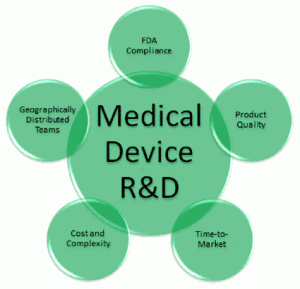Effective Project Management for Developing Medical Devices
April 24th, 2013 // 12:19 am @ jmpickett
Updated Daily – Read our latest FDA, cGMP Compliance News
If your organization is developing a new medical device (21 CFR Part 820), you need to have effective project management. Below are some of the most important tips in our experience to ensure success of your medical device:
#1 Always Under Promise and Overdeliver!
Having good, steady progress in the development of your medical device project is always going to hinge upon having a strong project manager. A good project manager is going to provide complete support for team members, take away any roadblocks and enact any change requests on time. If there is any movement away from the original concept of the device, no CMS documentation, poor estimates of effort, resource and process inefficiency, there is going to be a loss of time and money.
A good project manager should do everything possible to keep track of all project details and keep that project on schedule and right on budget. But it is a good idea to be pessimistic on dates of delivery and also estimate higher costs than you expect. That way you will have planned for contingencies in advance and you will avoid anyone being disappointed.
 #2 Provide Estimates, But Estimates Can Change
Project sponsors must raise enough capital, coordinate all of the regulatory submissions, make distribution plans and set up a pricing structure. Sponsors will ask for how much the device development will cost and the cost of transfer to manufacturing. One way to do this is to use historical data from the development of a related medical device. You also can hold brainstorming sessions to ID needed tasks for the goal of the project, and to make assumptions to come up with duration/effort estimates.
Keep in mind though that early estimates can undershoot the true costs of the device project. The design of the medical device can get more complex, materials and processes can get more expensive, and labor costs can increase. Any revised estimates have to be communicated early on and on a regular basis so the project owner is not shocked.
#3 Transparency Is Key
It is good to see that tasks are being executed on a timely basis. Control/monitoring is a key concept in strong project management. One thing you can do is to use a SharePoint task management process that you first fill in with all major tasks for the project, and then you add in any additional project items.
Part of most project manager functions is to give task owners a task and to ask each team member to update the percent they have completed each task. It is a good idea to have a lot of visibility on assigned tasks to ensure that they are being done on time.
This data should be given to the project owner – all parties benefit from knowing what each task member is doing. From the SharePoint task list, you can generate a report each week that you send to the owner of the project.
#4 Talk About Business Questions
It is ok to openly discuss business and operation realities of the client. How is the project being financed? When will you reach the market with the new device? Who is your major competitor? What technical parts of the project most concern you? Remember that it is your job as the project manager to assist project owners to align the actual deliverable to the goals of the company.
If you found this article interesting, please review our upcoming Webinar on how to handle complaints for medical devices. You will learn how to deal with complaints as defined in 21 CFR 820.198 and how to determine if an MDR or recall is needed, and much more.
Upcoming FDA cGMP Expertbriefings.com Webinars for 2013 include:
- April 25 – How to Survive PREDICT – FDA’s New Import Screening Program
- April 29 – Audit Your Lab Like an FDA Auditor – A Roadmap to cGMP Lab Compliance
- April 30 – How to Prepare Yourself for 21 CFR Part 11 Inspections
- May 1 – Avoiding Warning Letter Disasters With a Strong cGMP and GCP Quality Agreement
- May 2 – Avoid the CDRH eCopy Confusion – How to Prepare a Compliant eCopy Submission
- May 7 – FDA Recall Chief Update – How to Design a Bulletproof Recall Strategy
- May 13 – Breaking Regulatory Update for Life Science Firms – UFA Requirements for eCTDs
- May 14 – How to Effectively Source OTC, Generics and APIs from Indian Pharma Manufacturers
- May 15 – FDA Chief Counsel Report – How to Deal With and Avoid Warning Letters
- May 16 – Spend $500K on Compliance or $300 Million on Consent Decree? – Essential cGMP Compliance Tips for Sr. Management
- May 30 – The Essentials of Complaint Handling and Post Market Management – How to Comply With Global Regulatory Requirements



